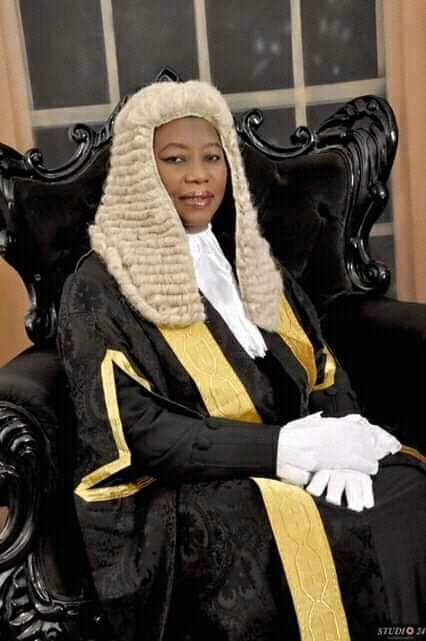Safiya Umar Badamasi SAN, the Director of Public Prosecution (DPP) of Katsina State Ministry of Justice and first Hausa Fulani woman to take silk has been appointed a Judge of the High Court of Katsina State.
This is an unusual appointment in Nigerian legal community owing to the fact that she is a Senior advocate of Nigeria (SAN) and SANs do not always aspire to be High court Judges. Her appointment has sparked debates in different quarters in the legal profession with majority of Lawyers hailing and praising her for the appointment.
Recently some Senior Advocates made a poor outing with a campaign to appoint Senior Advocates straight to the Supreme Court. Majority of Lawyers criticized that move and posited that Justices of Supreme court must climb through the ranks from the High Court.
The appointment of Safiya Badamasi has generated a lot of attention since it was announced with many believing that the right thing has been done.
Courtroom Mail has taken a peep into the UK to publish the profiles of the last seventeen High Court Judges appointed to the High Court of England and Wales,a jurisdiction where Nigeria borrowed its legal system and where the appointment of Queen Counsels to the High Court is not unusual.
Following an open competition for High Court judges launched in November 2018, the Judicial Appointment Commission (JAC) received 64 applications and made 17 recommendations for appointment in June 2019. The exercise was open to practitioners with or without previous judicial experience.
The Seventeen are as follows:(Count the numbers of Queen’s Counsels appointed and post on the comment section)
Robert Miles QC
Robert Miles grew up and went to school in London before studying Philosophy, Politics and Economics at Oxford University. He then completed a Diploma in Law at City University and a Bachelor of Civil Law at Oxford.
Called to the Bar in 1987, Robert specialised in commercial and financial law and civil fraud, often with a foreign element. He was appointed as Queen’s Counsel in 2002.
Robert has acted in many large financial cases. He was appointed as a Deputy High Court Judge in 2006 and has been the Attorney General of the Duchy of Lancaster since 2012.
David Foxton QC
David Foxton is a barrister. Born in South London, David spent his childhood in Taunton before moving with his family to Glasgow. He went on to Oxford University and King’s College, London to study law, becoming the first lawyer in his family.
Called to the Bar in 1989, David’s practice is in commercial law. He has significant experience of acting in all types of commercial disputes, in both court and in arbitration.
David was appointed as Queen’s Counsel in 2006, as a Recorder in 2009 and as a Deputy High Court Judge in 2016, sitting in the Queen’s Bench and Chancery Divisions.
He is also a Fellow of the International Academy of Trial Lawyers, a registered foreign lawyer with the Singapore International Commercial Court and is called to the Bar of the British Virgin Islands.
Michael Fordham QC
Mike Fordham grew up in Spalding, Lincolnshire where he attended local state schools and worked on a farm in the holidays. Grants and scholarships enabled him to study law at Oxford, the University of Virginia and Bar School.
As a barrister Mike specialised in public law, human rights, environmental law and immigration law. He has appeared in more than 50 cases in the Supreme Court and House of Lords, including most recently the Miller prorogation case. He has been Human Rights Lawyer of the Year and received the Bar Pro Bono Award for his work representing the United Nations High Commissioner for Refugees.
Throughout his career Mike has taught part-time at Hertford College, Oxford and written successive editions of the Judicial Review Handbook.
Mike was appointed as Queen’s Counsel in 2006, was a Visiting Fellow of the Bingham Centre for the Rule of Law and is Master of Students at Gray’s Inn. He was appointed as a Civil Recorder in 2010, a Criminal Recorder and an Upper Tribunal Deputy Judge in 2012, and a Deputy High Court Judge in 2013.
Thomas Linden QC
Born in London, Thomas Linden spent his childhood in Malawi and Nigeria where he attended primary school. His secondary education was at comprehensive schools in the south west of England, before studying law at Oxford University at both undergraduate and postgraduate level.
The first lawyer in his family, Thomas was called to the Bar in 1989 and was appointed as Queen’s Counsel in 2006. In practice, he was best known for his employment, discrimination and sports related work where he has appeared in a number of landmark cases in the Court of Appeal, the Supreme Court and the Court of Justice of the European Union.
He is a founder member of Matrix Chambers, a set established with the aim of taking a modern and inclusive approach to the provision of legal services.
Thomas served on the Attorney General’s ‘A’ Panel of Treasury Counsel, was the Chair of the Visitatorial Board of Oxford University and is a Bencher at Gray’s Inn.
He was appointed as a Recorder in 2005.
Andrew Henshaw QC
Andrew Henshaw grew up in Towcester, Northamptonshire where he attended the local comprehensive school. As the first in his family to go to university, Andrew studied law at Cambridge University, then qualified as a solicitor. He worked as a litigator at Linklaters, including a year in Washington DC before becoming a partner at Linklaters in 1994, and qualified as a solicitor-advocate in 1998.
In 2000 Andrew moved to the Bar and joined Brick Court Chambers, practising in commercial litigation and arbitration, public law and European law. He provided pro bono advice and representation as a solicitor and later at the Bar. Andrew was a member of the Attorney General’s panel of counsel from 2002 and on the Welsh Government panel of approved counsel from 2017. He was called to Bar of Northern Ireland in 2011, and appointed as Queen’s Counsel in 2013. Andrew became a Deputy High Court judge in 2017, sitting in the Administrative, Commercial and Crown courts.
Amanda Tipples QC
Amanda Tipples went to an independent school in Sussex before studying natural sciences at Cambridge University. Following her graduation, she continued there for a further year and studied law. Amanda was called to the Bar in 1991 and joined the chambers now known as Maitland Chambers, where she practised in chancery commercial litigation. In 2006 she was appointed to the A Panel of Crown Counsel.
Amanda was appointed a Recorder in 2009, Queen’s Counsel in 2011, a Deputy High Court Judge in 2013, and a Lieutenant Bailiff in Guernsey in 2016. From 2012 to 2016 she was a QC panel member of The Bar Tribunals Adjudication Service.
From 2016 to 2018 Amanda was the Chair of the Chancery Bar Association as well as a member of the Bar Council and its General Management Committee. In 2019 Amanda became the Chair of the Inns of Court and Bar Educational Trust. She is a bencher of Lincoln’s Inn and a volunteer for LawCare.
Judge Nicholas Hilliard QC
Nicholas Hilliard grew up and attended school in Berkshire. After studying law at Oxford University he was called to the Bar in 1981. As a barrister he specialised in criminal cases and inquests. Nicholas was appointed a Queen’s Counsel in 2008. He became a Recorder in 2001, and a Senior Circuit judge in 2012. In 2015 he was appointed the Recorder of London, the most senior judge at the Old Bailey.
John Cavanagh QC
John Cavanagh was born in Belfast and grew up near Stratford-on-Avon. He attended Warwick School and went on to study law at Oxford and Cambridge Universities, and the University of Illinois at Urbana-Champaign. He taught law at Illinois and Oxford. Before studying law he was a residential social worker at a community home school in Airdrie, Scotland. He spent some time working in law firms in Chicago before coming to the Bar.
He has spent his career at 11KBW Chambers, where he was Joint Head. Called to the Bar in 1985, John was appointed as Queen’s Counsel in 2001. He specialised in employment law and related areas of commercial, public, and European law. John was Chair of the Employment Law Bar Association from 2005 to 2007. He was appointed Recorder in 2004, and Deputy High Court Judge in 2017. John is a judge of the Administrative Tribunal of the Bank for International Settlements and a Bencher of Middle Temple.
Martin Chamberlain QC
Martin Chamberlain was born and brought up in Edinburgh. He attended school there before studying philosophy, politics and economics at Oxford University, and later for Bachelor of Civil Law and was awarded the Eldon Scholarship. In between, Martin took the Diploma in Law.
Called to the Bar in 1997, Martin specialised in public law, human rights, EU and international law. He was a member of the Attorney General’s Panel of Counsel to the Crown from 2001 and a Special Advocate from 2003. He was appointed QC in 2013 and a Deputy High Court Judge in 2016.
In practice, Martin focused on judicial review and appellate advocacy. He successfully defended the UK’s ban on broadcast political advertising in the European Court of Human Rights, and established the right of same sex spouses to survivors’ pensions.
He writes and lectures on public and national security law, and chaired the Constitutional and Administrative Law Bar Association from 2018 to 2019.
Judge Jennifer Eady QC
Jennifer Eady was born in East Anglia and attended state schools in Hampshire, Norfolk and Lincolnshire before studying Philosophy, Politics and Economics at Oxford University, the first generation of her family to go to university.
Jennifer was called to the Bar in 1989 and became a Queen’s Counsel in 2006. She specialised in employment and discrimination law, acting for employers and employees and their trade unions and appearing in many of the leading cases in her field. She demonstrated a commitment to pro bono work throughout her career and was a trustee of the Free Representation Unit for 7 years. Jennifer has also held public appointments outside the law, as an independent member of the Acas Council for 2 terms and as a Trustee of the Wallace Collection.
Jennifer was formerly a fee-paid Employment Judge and Recorder. In 2013 she was appointed a Senior Circuit Judge, assigned to the Employment Appeal Tribunal.
Alison Foster QC
Alison Foster grew up in Sussex, the daughter of art teachers. She is the first lawyer in her family. Alison attended grammar school in Bexhill, before studying English at Oxford University and then at the Courtauld Institute of Art, University of London. Alison completed the law conversion course with the benefit of scholarships from Jesus College and Inner Temple, and was called to the Bar in 1984. She became a Queen’s Counsel in 2002.
Alison’s practice encompassed most areas of public law and regulation including tax, acting both for and against the government. She appeared in a wide range of cases, from arguing that a jaffa cake is a biscuit for the purposes of VAT to representing the family of Cheryl James in the Deepcut Barracks Inquest.
She was appointed a Deputy High Court Judge in the Chancery Division in 2008 and in the Administrative Court in 2018. She been a Bencher of the Inner Temple since 2002.
Martin Griffiths QC
Martin Griffiths was born in London and educated at a state primary school and then at the City of London School, supported by choral and academic scholarships. He studied history and modern languages at Oxford University, and law at City University and the Inns of Court School of Law.
Called to the Bar in 1986, Martin practised in general commercial and employment law. He was appointed Queen’s Counsel in 2006. Martin served on the Bar Council from 2008 to 2015 and on the committee of the Employment Law Bar Association where he ran a pro bono scheme representing litigants in person in the Employment Appeal Tribunal. He is Chairman of the Inner Temple’s Advocacy Training Committee and Vice chairman of its Education and Training Committee. He is on the International Committee of the Inns of Court College of Advocacy.
He was appointed as a Recorder in 2009 and a Deputy High Court Judge in 2016.
Jeremy Johnson QC
Jeremy Johnson was brought up in Sheffield where he attended a local school. He studied maths and philosophy at Oxford University. He then completed a Graduate Diploma in Law at Middlesex University.
Called to the Bar in 1994, Jeremy has practised from 5 Essex Court in general common law and public law, often acting in cases involving the police and government departments. Jeremy recently represented South Wales Police in the first ever legal challenge against the use of automatic facial recognition technology.
He was appointed as a Recorder in 2010, a Queen’s Counsel in 2011, and a Deputy High Court Judge in 2016.
Frances Judd QC
Frances Judd spent her childhood in Hong Kong and then Portugal, first attending school in Lisbon and then in Canterbury. She studied at Cambridge University and was the first member of her family to become a lawyer.
Frances was called to the Bar in 1984 and specialised in public and private law children’s cases including complex medical cases, sexual abuse, international and domestic relocation, adoption and surrogacy.
She was appointed as Queen’s Counsel in 2006, a Recorder in 2002 and a Deputy High Court Judge in 2011. She was Head of Chambers at Harcourt Chambers between 2009 and 2018, and has been Chair of the Family Law Bar Association since 2018.
Pushpinder Saini QC
Pushpinder Saini is the son of Punjabi Sikh immigrants from East Africa. His family left Kenya in the early 1970s and settled in Southall, West London. Educated in Southall at Dormer’s Wells Comprehensive School, Pushpinder went on to graduate with firsts in the Bachelor of Arts and Bachelor of Civil Law degrees at Oxford University, and become a Senior Scholar of Gray’s Inn. Pushpinder taught law at Oxford and the London School of Economics while studying for the Bar.
He was called to the Bar in 1991 was in practice at 2 Hare Court and Blackstone Chambers for all his career, specialising in commercial law, public law, EU law and human rights. Pushpinder was appointed as Queen’s Counsel in 2008, as Bencher of Gray’s Inn in 2014, and as a Deputy High Court Judge in 2017.
Karen Steyn QC
Karen Steyn was born in South Africa and brought up in Kent, where she attended local state schools before studying history at the University of Liverpool and taking the Graduate Diploma in Law at City University.
Called to the Bar in 1995, her practice covered a range of public law, human rights, public international and information law. She is known for her work in the contexts of armed conflict, national security, human rights and freedom of information. She has appeared at the Supreme Court in a number of significant cases including representing Liberty in DSD v Commissioner of Police of the Metropolis, which imposed an operational duty on the police force to conduct a proper investigation into allegations of ill treatment.
She was a member of the Equality and Human Rights Commission’s A Panel of Counsel, the Attorney General’s A Panel of Counsel and the Welsh local authorities’ panel. Karen was appointed a Queen’s Counsel in 2014 and a Deputy High Court Judge in 2016.
William Trower QC
William Trower grew up in Hertfordshire and studied history at Oxford University before completing the Diploma in Law at City University.
Called to the Bar in 1983, he was appointed a Queen’s Counsel in 2001 and is a bencher of Lincoln’s Inn. William specialised in insolvency and corporate restructuring, banking and company law. He has acted as leading counsel for the administrators of Lehman Brothers, taking a number of disputes to the Court of Appeal and the Supreme Court. He has been instructed in other complex insolvencies and financial restructurings, both in the UK and abroad.
William was appointed a Deputy High Court Judge in 2007. He has been head of chambers at South Square, the independent reviewer of complaints for the Insolvency Practitioners’ Association, a member of the Insolvency Rules Committee and a non-executive member of the Board of the Insolvency Service. He has edited and contributed to a number of textbooks on insolvency and restructuring.



